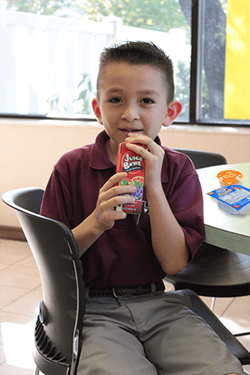School breakfast improves achievement scores
A recent study conducted by David Frisvold, an assistant professor of economics at the University of Iowa, finds students who attend schools that participate in the U.S. Department of Agriculture's School Breakfast Program (SBP) have higher achievement scores in math, science, and reading than students in schools that don't participate. This is consistent with other studies about school breakfast. A brief prepared by the Food Research and Action Center (FRAC), summarizes the findings from research on school breakfast:
School breakfast participation is low
The School Breakfast Program is available to all schools, public or private. Traditional breakfast school meals are served in the cafeteria, prior to school. However, only half of the kids eligible for free or reduced school lunches, actually participate in SBP. Experts agree that there is a stigma related to eating breakfast in the cafeteria, while the other students socialize.
One approach that is working well is free breakfast for all students, served in the classroom. According to FRAC, the benefits of breakfast in the classroom are:
Serving breakfast in the classroom pays off
Some teachers push back on serving breakfast in the classroom as they feel it might impact instructional time. But educators that work in schools with breakfast in the classroom say it only takes about 15 minutes each morning. Many schools succeed by using grab-n-go shelf-stable breakfast items that the students take as they enter the classroom. The teacher uses this time to take attendance, collect homework, or read school announcements. As a result, 76% of teachers see an improvement in alertness during morning lessons and they like knowing their students are energized and ready to learn.
The time spent with breakfast in the classroom pays off later. Frisvold’s research found that the impact of SBP has on achievement scores is cumulative. The longer the school participated in the SBP, the higher their achievement. Math scores were 25% higher at participating schools during a students’ elementary school tenure than would be expected otherwise. Frisvold says, reading and science showed similar gains.
Implementing breakfast in the classroom
Looking for help implementing breakfast in the classroom at your school?
Click here for more information on GA Foods’ shelf-stable breakfast meals, Breakfast Club.
Download free infographic, What's in the Bag?
More resources
For more information on the impact of breakfast on academic achievement, watch: http://childobesity180.org/breakfast-and-achievement
Resources for breakfast in the classroom:
http://docs.schoolnutrition.org/SNF/BIC/
http://frac.org/federal-foodnutrition-programs/school-breakfast-program/breakfast-in-the-classroom/
http://www.neahin.org/educator-resources/breakfast-in-the-classroom.html












